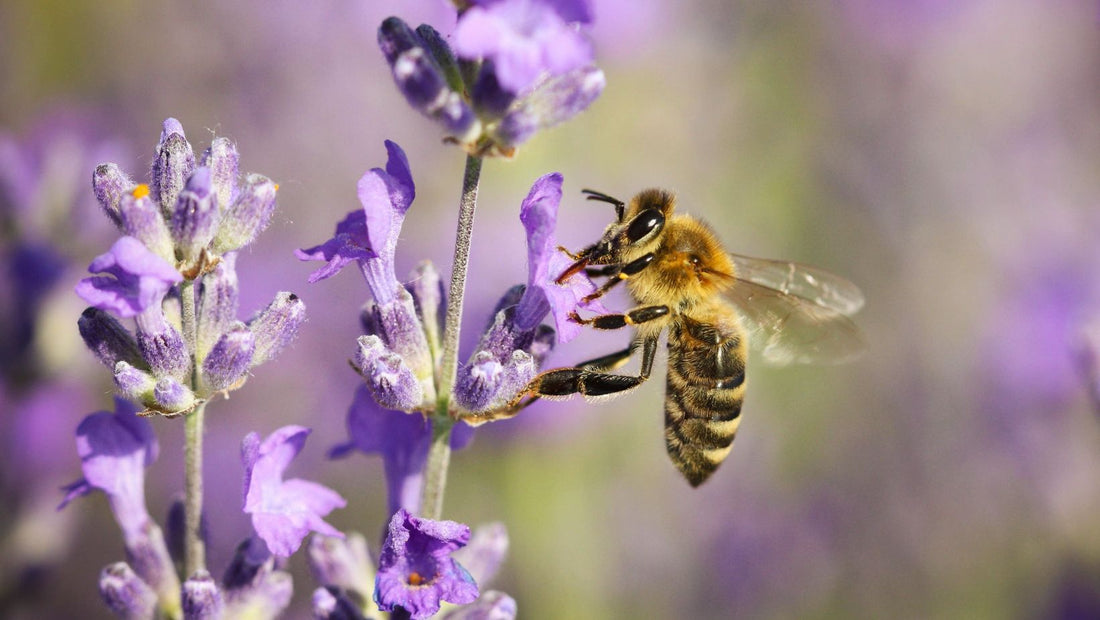
The Essential Role of Bees: Nature's Unsung Heroes
Share
This week we launched "The Hive" Collection and want to use this as a chance to highlight the importance of these furry little friends and everything they do to help nature.
When we think about the natural world and its intricate web of interconnections, there is one tiny creature that plays a huge role: the bee. Bees, often overlooked and underestimated, are so important to the survival of our planet. Their humble presence in gardens, meadows, and fields is so important.
Here's a few reasons the incredible bee is so important and why we must appreciate and protect these remarkable cuties.
Pollination Powerhouses
One of the most significant contributions of bees lies in their role as pollinators. As they buzz from flower to flower collecting nectar, bees transfer pollen, enabling plants to reproduce. This process, known as pollination, is responsible for the production of fruits, seeds, and nuts. In fact, nearly one-third of the food we consume worldwide relies on pollinators like bees.
Biodiversity Guardians
Bees are essential for maintaining biodiversity. They visit an extensive range of plant species, including wildflowers and crops, creating connections between various ecosystems. By facilitating cross-pollination, bees ensure genetic diversity among plants, leading to healthier and more resilient populations. This diversity is crucial for ecosystem stability, providing habitats and food sources for a wide array of animals and insects.
Economic Workhorses
Apart from their ecological importance, bees have significant economic value. Agriculture heavily relies on bees for pollination, contributing to the growth of crops. Without bees, the yield and quality of many fruits, vegetables, and nuts would significantly decline. Not to mention, honey production, beeswax, and other bee-related products provide income and livelihoods for numerous beekeepers around the world.
Environmental Stewards
Bees also act as environmental stewards, playing a crucial role in preserving natural habitats. As they forage for nectar and pollen, they inadvertently transfer pollen between plants, promoting the growth of our native flora. By doing so, bees contribute to the conservation of ecosystems, including our native forests. Their activities help maintain the balance of these habitats and ensure the survival of countless plant and animal species.
Challenges and Conservation
Despite their immense importance, bees face numerous challenges that threaten their populations worldwide. Habitat loss, pesticide use, climate change, and diseases have all contributed to declining bee populations in recent years. This decline poses a severe risk to global food security, ecosystem stability, and biodiversity.
To protect and support bees, it' super important for us all to take action. Here are a few steps we can all take:
-
Plant bee-friendly gardens: Choose a variety of flowers that provide nectar and pollen throughout the year. Native plant species are particularly beneficial.
-
Minimise pesticide use: Choose organic or pesticide-free alternatives in your garden. Avoid using chemicals that are harmful to bees and other pollinators.
-
Support local beekeepers: Buy locally produced honey and other bee-related products. This supports beekeepers and encourages sustainable beekeeping practices.
-
Create awareness: Educate others about the importance of bees and the threats they face. Share information and resources to promote bee conservation.

Bees are the unsung heroes of our planet, playing an indispensable role in maintaining ecosystems, supporting agriculture, and ensuring our food security. Their contribution to biodiversity and environmental balance cannot be overstated. By understanding and appreciating the importance of bees, and taking action to protect them, we can secure a sustainable future for ourselves and the planet we call home. Let's embrace the buzz of these remarkable insects and work together to safeguard their existence.
Although Ash is allergic to bees she loves a bumblebees yellow and black colouring and their fluffy butts!
Nikita wants a bumblebee tattoo because Shaun calls her bumble bee but also because of her love of bees and what they do. And who can resist their FLUFFY LITTLE BUTTS?! 🐝🐝🐝
It’s insane that something so small can contribute and play such a huge part in something so incredibly important. WE LOVE BEES !
